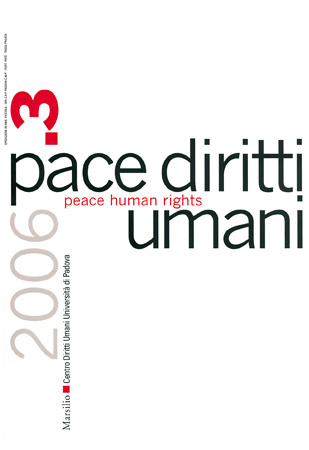Raccolte

Attori non-statali, internazionalizzazione dei diritti umani e responsabilità sociale delle imprese
- Contenuto in
- Pace diritti umani - Peace Human Rights, 3/2006
- Tipologia pubblicazione
- Articolo / Saggio
- Pagine
- 7-22
- Lingua
- IT
Non-state Actors, Internationalisation of Human Rights, and Corporate Social Responsibility
Elena Pariotti
In the globalization age law presents two basic features: (1) it is characterised by an ever less hierarchical framework; (2) non-state actors have been playing an increasing role in rule making, as it is showed by the emerging of the new lex mercatoria. Such features do not matter for international private law only, but also for the process of human rights internationalization, which is developing through interconnections among transnational law and public international law trends.
This new picture brings about some relevant changes involving the overcoming of the classical view that international law speaks to States and international organisations only. Obligations are increasingly placed to private actors as well.
In face of these processes, transnational corporations (TNCs) are viewed as strategic actors, capable to give global echo to the standards they agree to. Here the problems is whether and how private governance regimes, which stem from contractual relations among «global» private actors, allow to be mitigated by imperative norms, which should be created and applied even against what would be desirable for the parts involved. This is the problem of the emerging of something like the jus cogens in transnational law.
TNCs’ obligations seem to lie at the borderline between ethics and law and the increased role played by soft law in international legal system contributes to make the two spheres conflate. Synergies among international law, corporate management patterns, and ethics stem both from a great amount of soft law sources that concern transnational corporations’ conduct.
The paper addresses the overlap between soft law regulation and corporate social responsibility paradigm. It aims at assessing whether this very convergence could be a proper path to enforce private actors’ legal liability for human rights when operating beyond their home state.
Since human rights are the key notion of this interplay, such issue is strongly connected to another one, concerning whether and at which conditions human rights may be regarded as endowed with horizontal effect. Human rights function as normative criteria for identifying TNCs’ stakeholders and for justifying their claims. The reference to human rights contained in corporate social responsibility (CSR) model implies that both negative and positive correlative rights are ascribed to corporations.
The analysis aims at showing that the interplay between law and ethics should be differently assessed depending on which kind of correlative duty is at stake. With regard to negative duties, CSR initiatives risk weakening the impact of international law, which is endowed with resources to recognize the horizontal effect of human rights. For the same reason, the soft law concerning TNCs’ conduct contribute to confusion, by presenting the respect of rights, independently from the kind of correlative duties involved, as an aim that corporations may voluntarily undertake. On the contrary, when positive duties are at issue, to the extent that horizontal effect cannot be assumed, CSR initiatives as well as soft law measures turn out to be much more useful. Nevertheless, it should not be neglected that in this case private actors’ role should be narrower and strictly subordinate to the programmes worked out by institutional actors.

